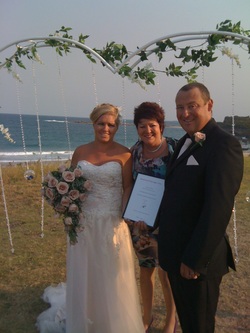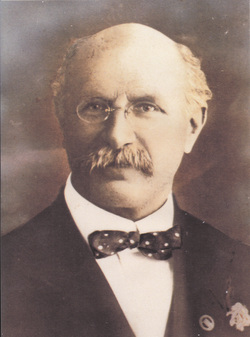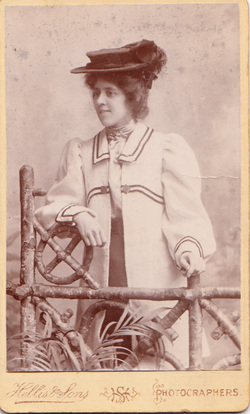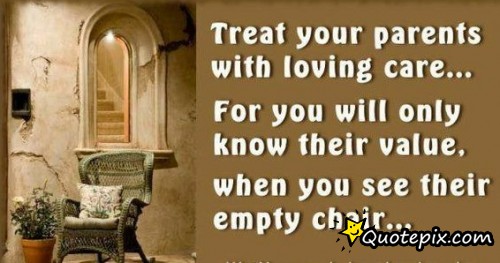
 A really lovely couple who only had a very small wedding 14 years ago always intended to have a really special ceremony and reception when they could afford it. Friday was the day! It was the happiest occasion imaginable...so much love, laughter and smiles...beautiful children, a stunning 'bride', a handsome 'groom' and immaculate bridal party...with a ceremony overlooking the ocean. The guest register was a special book I created for them tracing their 14 years together. And did everyone enjoy it? You bet. The couple have just emailed me to say, "We both just wanted to thank you again for the amazing job you did with the ceremony and the book. Everything was perfect." Thank you guys, I enjoyed every single second with you.
0 Comments
 It wasn’t that long ago that “people believed that reminiscing was a sign of senility—what we now call Alzheimer’s disease,” wrote Robert N. Butler (Kunz 2007). After working with healthy volunteers for 11 years, in 1961 Butler “postulated the existence of the life review as a normal function of the later years and not a pathological condition. Memories, reminiscence, and nostalgia all play a part in the process. "Far from living in the past or wandering, as was thought, older people were engaged in the important psychological task of coming to terms with the life they had lived. They sought to make amends for acts of omission and commission, resolve conflicts, and reconcile alienated relationships.” Although some aspects of brain function do decrease as we age, Gene D. Cohen says the “older brain is more resilient, adaptable, and capable than we thought.” When we’re young, for example, we tend to favour one side of the brain over the other. In the second half of life we tend to integrate the hemispheres. Autobiography engages both sides of the brain and as we age we have a stronger impulse to tell our life story —not only because storytelling and reminiscence are part of the natural work of elders, but also because they “become appealing ways of giving back—sharing what we have learned” (Cohen 2007). But writing your own life story is a difficult and daunting process so why not let author Rebecca Skinner do it for you? It will stimulate your brain and be a wonderful legacy to leave for future generations.  I am writing the life story of a fascinating lady who endured one of the worst Japanese prisoner-of-war camps in Indonesia during World War 11. During my research I was able to discover that her camp commandant was recognised as being a real sadist. He was tried for war crimes and found guilty. I discovered how he appealed his sentence and this appeal went before a judge - coincidentally whose wife had also been held in the same terrible camp where so many women and children died. His appeal, understandably, was rejected and the commandant was executed by firing squad. Her stories make incredible reading and I feel so privileged to be able to write her life story so her experiences will be able to be treasured by her children, grandchildren and great grandchildren as well as future generations to come.  I am flying high with excitement as I've been asked to write the life stories of two very interesting people and just can't wait to join them both on their journey through their memories. I will help clear away the clouds, blow away the cobwebs and help them recall the wonderful events and feelings that make up their long and fascinating lives. . How true this is. I only wish I could have spent more time with my mother, who died when I was a teenager. I wish I had written down her stories so I could have passed them on to my children and others in the family who never met her.
 Did you know Bill Clinton said, "I really think that anyone who’s fortunate enough to live to be over fifty years old should take some time, even if it’s just a couple of weekends, to sit down and write the story of your life, even if it’s only twenty pages, and even if it’s only for your children and grandchildren…You’ll be surprised what you find." If writing your life story seems too huge a task, help is at hand from Celebrating Life's Chapters. Just one interview of around one hour could result in a beautiful, hard-cover book that you would be proud to show your family and hand down to generations to come. Whatever life we have experienced, if we can tell our story to someone who listens, we find it easier to deal with our circumstances, so says Margaret J. Wheatley,
author and consultant on organisational behaviour. Telling the stories that make up your life have so many physical and emotional benefits - research shows, among other benefits, it boosts your immune system and can help you achieve greater success. As a Siberian elder said, "If you don’t know the trees you may be lost in the forest, but if you don’t know the stories you may be lost in life." Don't be lost - find better health and a better life by telling your story through Celebrating Life's Chapters. It is the best gift to yourself and to future generations. I found this really beautiful quote from a Vietnamese monk...
“If you look deeply into the palm of your hand, you will see your parents and all generations of your ancestors. All of them are alive in this moment. Each is present in your body. You are the continuation of each of these people.” - THICH NHAT HANH (Vietnamese Monk, Activist and Writer. b. 1926) This is why I believe everyone should tell their family story, because once one generation goes, it is so hard to piece together the parts that make our ancestors who they were. Yes, maybe we can delve deep and find some brief details of their lives, but the heartwarming stories that only they know, are so easily lost forever. Their funny stories, their important moments and particularly, how they felt, are the parts that really enrich the tapestry of life. So if you want to ensure these wonderful tales have a chance to live on forever, encourage your parents or grandparents to tell their life story. Sit with them and help prompt their memories and record what they tell you. You may be inspired to write their story for them - or get someone else to do it for you. Imagine what a wonderful gift it would be to help celebrate their birthday or wedding anniversary and what a unique present to hand on to future generations. Everyone's life is important and deserves to be remembered, and what better way than through a book - a tangible, tactile way to ensure your memories never die.
My daughter told me a little while ago that the thing she would like most from me is a book telling my life story and that of my family - because she was scared she would forget the family stories I had told her. It got me thinking that so many other people would cherish a similar gift. Basically it means one can live on forever through one's memories. What a wonderful way to communicate with future generations to come! But writing a book - especially about oneself - is hugely daunting as well as a massively time consuming task. How to gather one's memories? What to write? How to write? Where to start? The list of questions goes on and on. What did I do? First I signed up for a book writing course. Though I have spent my life writing and editing on a daily basis as a journalist, I decided I needed some specialist help. I read everything I could get my hands on about writing memoires, writing life stories and writing non-fiction. Then I decided on what I wanted to write about, sorted it out into logical chapters, linking my life with other family members and their stories, and then I began to write. But it wasn't easy even for a writer like myself, so it made me think that perhaps I could offer this service to others, who were less experienced with writing and editing. There were not many people out there offering this service and those that were, were charging a huge amount of money. But though I have a feeling that it's only older people who would cherish their life story being recorded, there are also all those interested in geneology. Thanks to the internet and ease of research, this is now the number 1 hobby in Northern America and Australia is tipped to follow suit. Ancestry.com, Australia's most popular online resource for family and social history recently commissioned a survey which found that 83% of Australians are interested in their family's history and 72% have actually done some research. But what are they doing with all the information they have found? Stored it on their computer - put cuttings in a shoebox? So, I thought perhaps I could help these people too, weave their research into a highly readable and professional story... And because I think everyone's story deserves to be told, I decided to ensure I could produce packages to suit everyone's budget. So, hence the new business, a new chapter in my life. And that's certainly cause for celebration! |
AuthorRebecca Skinner is a journalist, editor and writer who is also a civil celebrant, committed to helping people cherish special moments in their lives. From ceremonies with a difference together with books of living memories as a unique memento - to writing life stories - she is the specialist in celebrating life's many chapters. Archives
April 2018
Categories
All
|


 RSS Feed
RSS Feed
